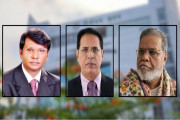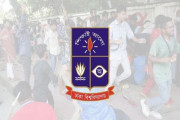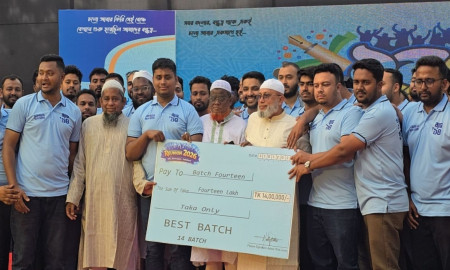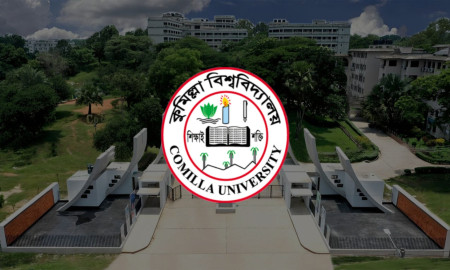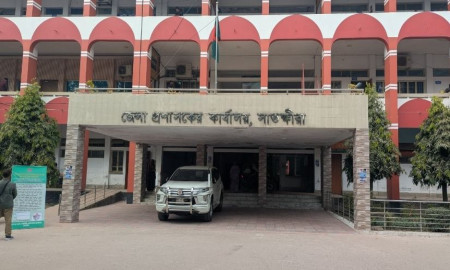Indigenous Peoples Facing Increased Marginalization: Santu Larma
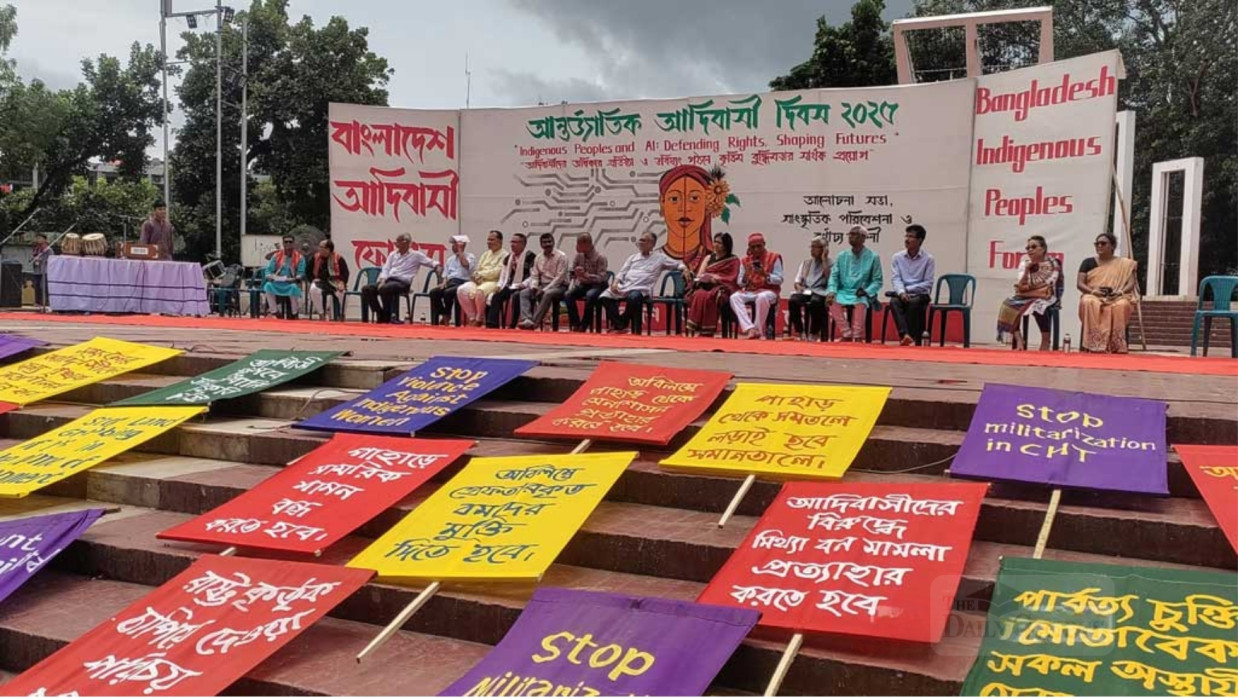
The future of indigenous peoples remains shrouded in uncertainty and anxiety, remarked Bangladesh Indigenous Peoples Forum President Jyotirindra Bodhipriya Larma, known as Santu Larma. He said, “The student-people led July uprising of 2024 under the interim government’s reform initiatives did not feel the need for dialogue with any effective organization or leadership of indigenous peoples.” Due to physical illness, he was unable to attend the International Indigenous Peoples Day rally at Dhaka’s Central Shaheed Minar on Saturday, but sent a written speech that was read out at the rally.
On December 2, 1997, the peace accord was signed between the Bangladesh government and the Parbatya Chattagram Jana Samhati Samiti (PCJSS). However, hill leaders have been alleging that most of the accord has not been implemented even after a long time.
Santu Larma said, “Most of the people in the hills and plains of Bangladesh are still living under the threat of existence. In a country that gained independence through the Liberation War of 1971, they are gradually becoming landless and displaced. “The 1997 Chittagong Hill Tracts Accord signed to solve the problems of hill indigenous peoples has not been implemented by this state even after 28 years. As a result, the existing problems in the hills are manifesting in various forms.
“The situation of plainland indigenous peoples is even more precarious. Through land eviction, women oppression, discrimination, impunity—these are making indigenous peoples more marginalized from marginal.” He called upon progressive and secular-minded civil society, intellectuals, teachers, journalists, human rights activists, and political leaders to strengthen the struggle for the existence of indigenous peoples.
Santu Larma said, “I reiterate my call to the entire indigenous peoples and the young generation to make the struggle for indigenous rights more united and organized by lifting them from the abyss of marginalization.” He commented that there is no alternative to progressive ideals in accelerating the struggle for rights and establishing a democratic, secular, and exploitation-free society.
The Bangladesh Indigenous Peoples Forum observed International Indigenous Peoples Day by raising demands including constitutional recognition of indigenous peoples, proper and full implementation of the Chittagong Hill Tracts Accord, formation of separate ministry and land commission for plainland indigenous peoples. The rally included discussions, cultural performances, and a colorful procession with traditional musical instruments of various indigenous communities.
Students from Hajong, Bom, Khasi, Marma, Garo, and other communities participated in the rally with banners. This year’s Indigenous Peoples Day theme is ‘Effective Application of Artificial Intelligence in Establishing Indigenous Rights and Shaping the Future’. In the discussion session, Supreme Court lawyer Sara Hossain said, “Many in the current government are rights activists, environmental activists. Many indigenous peoples also joined the July movement.
“We know about Michael Chakma’s disappearance. He returned through the July uprising. Now we must raise the demand for trial of Michael Chakma’s disappearance. We must also raise the demand for justice in the killings of Kalpana Chakma, Alfred Soren, Piren Snal.”
She said, “Those who were oppressed and imprisoned for working on rights have returned. After the uprising, we have seen many rights activists return. “But why can those in the hills who had to leave their homes for raising rights demands not return yet? Many from the Bom community are still displaced. The minimum legal assistance they deserve, they are not getting.”
The general secretary of the Communist Party of Bangladesh, Ruhin Hossain Prince, said, “We have come a long way after the uprising, but sadly, there is no good news for indigenous peoples. Rather, land grabbing in the hills continues.
“Corridors are being built in Rakhine in the name of destabilizing the hills. The government has formed various reform commissions, but we see no reform commission for indigenous peoples. The interim government has no expectations left for indigenous peoples. So ahead, we have no path but struggle.”
Bangladesh Hindu Buddhist Christian Unity Council presidium member Kajal Debnath said, “In the anti-discrimination movement, a graffiti named ‘Leaf Tearing Prohibited’ was drawn by students. It was also printed in textbooks. The graffiti read—Hindu Buddhist Christian, Indigenous, Bengali. Some people wanted to tear that page. Hearing them, the government itself tore the page from the textbook. The page was torn from books printed with public tax money.”
The co-general secretary of Bangladesh Socialist Party (BASAD), Rajekuzzaman Ratan, said, “The slogan in the anti-discrimination movement was—‘In hills or plains, struggle will run parallel.’ What role has the government played for indigenous peoples after the July uprising? The reality is the state has not tried.”
Ratan’s comment: In the past too, indigenous peoples participated in various movements in Bangladesh, but the state did not return their rights. The chief executive of Citizens Initiative and joint coordinator of Chittagong Hill Tracts Accord Implementation Movement, Zakir Hossain, said, “The government came to power through the anti-discrimination movement, but the government’s work does not show an anti-discrimination stance.”
Seven demands were raised from the rally, which include:
1. Constitutional recognition of indigenous peoples with self-determination rights.
2. Proper and full implementation of the Chittagong Hill Tracts Accord. Announce a time-bound roadmap for this purpose.
3. Formation of separate ministry and land commission for plainland indigenous peoples.
4. Shut down all media or institutions propagating distorted, fragmented, or false information about indigenous peoples.
5. Stop oppression and torture on indigenous peoples and immediately withdraw all false cases.
6. Ratify the UN Declaration on Indigenous Peoples adopted in 2007 and ILO Convention 169, and implement ILO Convention 107.
7. Observe International Indigenous Peoples Day at the state level.
In the presidential speech, Indigenous Peoples Forum vice-president Ajay A Mru thanked everyone for participating. The welcome speech was given by Indigenous Peoples Forum general secretary Sanjib Drang. The Bengali translation of the UN Secretary-General’s message for Indigenous Day was read by Boishakhi Hajong.
Indigenous Peoples Forum co-general secretary Dr. Gajendra Nath Mahato, women affairs secretary Falguni Tripura, member Helena Talang, Bangladesh Indigenous Youth Forum president Anthony Rema, Indigenous Student Struggle Council president Ananta Tanchangya, and many others spoke.
Afterwards, a procession toured Dhaka University’s TSC and returned to Shaheed Minar. At the start of the rally, the national anthem and mass songs were performed by Dhaka University Zoom Literature and Cultural Society.


